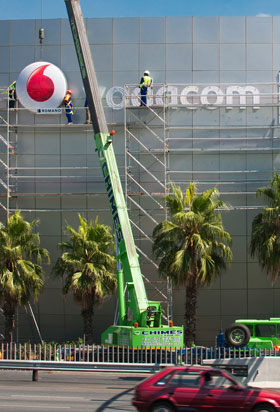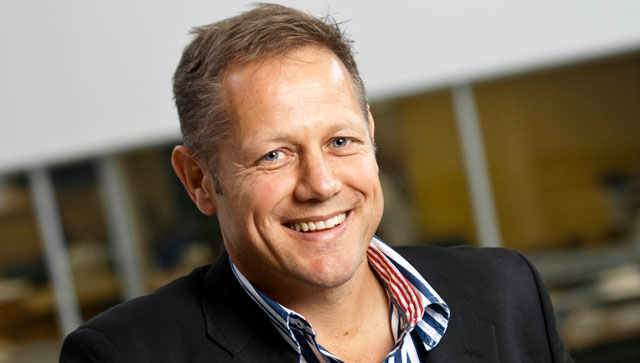
The legal action brought by Wi-Fi hotspot specialist WirelessG against minority shareholder Vodacom is a “desperate attempt” to save its business, the mobile operator has argued in papers filed at the high court in Pretoria.
The allegation is a contained in an affidavit signed by Vodacom South Africa business development managing executive Tlhabeli Ralebitso and submitted to the court last week.
TechCentral reported in January that WirelessG had taken Vodacom, which holds 26% of WirelessG’s equity, to the high court, accusing the operator of reneging on a shareholders’ agreement that grants its partner exclusivity over any Wi-Fi infrastructure Vodacom wants to build.
WirelessG CEO Carel van der Merwe said at the time that Vodacom had begun to backtrack on the agreements between the parties after it realised that “data offloading” onto Wi-Fi from its mobile broadband network was becoming a significant strategic opportunity.
Van der Merwe claimed that Vodacom had held discussions with a number of WirelessG’s rivals in the past nine months and also ran pilot Wi-Fi projects late last year, without involving the company, in contravention of the shareholders’ agreement. He said WirelessG originally sold the 26% stake to Vodacom at a 49% discount in exchange for various commercial rights, including exclusivity rights for providing Wi-Fi services and infrastructure.
In its court papers, Vodacom has denied working with WirelessG’s rivals to provide public Wi-Fi hotspots — although its parent, the UK’s Vodafone, has done so — and has strongly denied that it breached the shareholders’ agreement.
Ralebitso says that a “first right of refusal” clause in an agreement between the parties does not extend beyond public Wi-Fi hotspots to infrastructure Vodacom may want to build to offset heavy load on its 2G and 3G cellular networks.
In the affidavit, Ralebitso argues that WirelessG, through its application to the court, is seeking to “impose itself” on the mobile operator and on areas of its business in which it has “no obligation or intention to include WirelessG”.
Vodacom has served notice on WirelessG that it intends terminating both its “retailer agreement” and its “binding agreement” with the Wi-Fi provider. These agreements will expire at the end of February 2013 and, according to Vodacom, will result in restricted cash flow at WirelessG.
Under these agreements, Vodacom says it provided a monthly revenue guarantee to WirelessG of R250 000 plus a monthly fee of R50 000.
“It is this predicament which, in Vodacom’s submission, has caused WirelessG to make this application [to the court],” Ralebitso says. “WirelessG must have come to the realisation that the business is not sustainable without monthly payments [from Vodacom] and on income generated only from its public hotspot business. It is for this reason that this application is made, in a desperate attempt to extend WirelessG’s participation into other areas of Vodacom’s business, areas in which it was never intended that WirelessG would participate.”

Ralebitso says that, contrary to expectations, consumer demand for WirelessG’s Wi-Fi hotspots “was not realised” and the sale by Vodacom of Wi-Fi products on the back of the retailer agreement between the parties brought in just R20 000/month — “a turnover which could not sustain this line of business”.
“Revenues never reached a level that would release Vodacom from paying the revenue guarantee and so this has meant that Vodacom has paid R18m — R300 000 for each month for five years — without being able to generate any net profits in return.”
Vodacom says, too, that it invested R30m in buying equipment and developing and implementing WirelessG’s in-flight Wi-Fi system on Mango’s fleet of aircraft. However, this initiative is “not generating any positive gross profits”.
Ralebitso says the first right of refusal clause in the shareholders’ agreement requires Vodacom to offer to integrate the services of other Wi-Fi infrastructure providers with the systems of WirelessG and no more.
“This obligation cannot — as [WirelessG] is now trying to do — be extended to oblige Vodacom to enter into the Wi-Fi field by contracting only with a Wi-Fi infrastructure provider, let alone to contract only with WirelessG.”
Ralebitso adds that the clause does not apply where Vodacom itself builds a Wi-Fi service by installing its own physical equipment and conducts its own authentication of customers using its own billing systems.
“Vodacom has no intention of causing the demise of WirelessG, particularly given the investment it has made in that company, but cannot be compelled to continue pouring money into a business which does not deliver a return on investment,” Ralebitso’s affidavit says.
Vodacom says WirelessG brought the application because it wants a court order that will allow it to operate its “loss-making business on credit” from the mobile operator.
Among other things, Vodacom says the granting of any interim relief by the court which ultimately is found not to have been justified could give its rivals a head-start in Wi-Fi offloading services, including in tying up exclusive deals.
In the affidavit, Ralebitso also denies WirelessG’s claims that it has engaged with Dimension Data’s Internet Solutions and its Wi-Fi partner AlwaysOn.
“Vodacom has not engaged with Internet Solutions/AlwaysOn or any other provider of public hotspot services. All Vodacom integrations to Wi-Fi infrastructure providers to date have been done by WirelessG,” Ralebitso says. “In 2005, Vodafone engaged Internet Solutions/AlwaysOn as its South African Wi-Fi roaming partner [but] there is no obligation on Vodafone to prefer WirelessG.”
The high court is expected to hear the case in early April. — (c) 2013 NewsCentral Media




